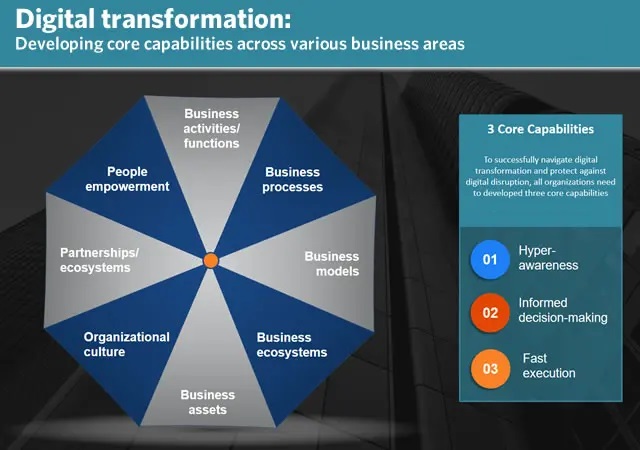Your Trusted Partner for your business Digital Transformation journey…
Digital transformation is the integration of digital technology into all areas of a business, fundamentally changing how you operate and deliver value to your customers in the global network connected world. It is a process of forming strategies and planning for organisational changes. It’s also a cultural change that requires organizations to continually challenge the status quo, experiment, and get comfortable with failure. Digital transformation is imperative for all businesses, from the small to the enterprise. It begins with empowering the employees with new tools , techniques and methodologies to create data-driven strategies and innovation. Organizations are incorporating its systems in all of its communications because there is a need for urgent advancement in the operations of the business. Organizations need to adopt new technologies available in order to succeed along with existing legacy systems using digital technologies.
Customers can verify us as your suitable partner company and collaborate in your journey to help you bring digital transformation in your business. It helps data to flow over broadband technology and can be accessed anywhere. It helps your business to grow and provide various opportunities and direct communication with the customers, through multiple channels. It works upon the concept to transform innovation, team, and culture with technology. Through digitization, organizations can improve the decision-making quality of the management. It can also develop new products and services.
In today’s world, IT is not a tool anymore but works as a seed for the growth of the company. It helps the business to grow without the use of traditional way of doing business, which was a lengthy process.
A business may take on digital transformation for several reasons. But by far, the most likely reason is that they have to: It’s a survival issue. In the wake of the pandemic, an organization’s ability to adapt quickly to supply chain disruptions, time to market pressures, and rapidly changing customer expectations has become critical. Although digital transformation will vary widely based on organization’s specific challenges and demands,
These are some of the digital transformation elements which are often cited:
- Customer experience
- Operational agility
- Culture and leadership
- Workforce enablement
- Digital technology integration
Digital transformation areas
Digital transformation in the integrated and connected sense which it requires can, among, others, touch upon the transformation of:
- Business activities/functions: marketing, operations, human resources, administration, customer service, etc.
- Business processes: one or more connected operations, activities and sets to achieve a specific business goal, whereby business process management, business process optimization and business process automation come into the picture (with new technologies such as robotic process automation -RPA). Business process optimization is essential in digital transformation strategies and in most industries and cases is a mix of customer-facing goals and internal goals today.
- Business models: how businesses function, from the go-to-market approach and value proposition to the ways it seeks to make money and effectively transforms its core business, tapping into novel revenue sources and approaches, sometimes even dropping the traditional core business after a while.
- Business ecosystems: the networks of partners and stakeholders, as well as contextual factors affecting the business such as regulatory or economic priorities and evolution. New ecosystems are built between companies with various background upon the fabric of digital transformation, information, whereby data and actionable intelligence become innovation assets.
- Business asset management: whereby the focus lies on traditional assets but, increasingly, on less ‘tangible’ assets such as information and customers (enhancing customer experience is a leading goal of many digital transformation “projects” and information is the lifeblood of business, technological evolution and of any human relationship). Both customers and information need to be treated as real assets in all perspectives.
- Organizational culture, whereby there must be a clear customer-centric, agile and hyper-aware goal which is achieved by acquiring core competencies across the board in areas such as digital maturity, leadership, knowledge worker silos and so forth that enables to be more future-proof. Culture also overlaps with processes, business activities, collaboration and the IT-side of digital transformation. In order to bring applications faster to market changes are required. That’s the essence of DevOps: development and operations. In order to make IT and OT work together in businesses/processes/activities, change is required too (it’s not just the information and operational technologies, it’s the processes, culture, collaboration). Etc.
- Ecosystem and partnership models, with among others a rise of co-operative, collaborative, co-creating and, last but not lost, entirely new business ecosystem approaches, leading to new business models and revenue sources. Ecosystems will be key in the as-a-service-economy and in achieving digital transformation success.
- Customer, worker and partner approaches. Digital transformation puts people and strategy before technology. The changing behavior, expectations and needs of any stakeholder are crucial. This is expressed in many change sub-projects whereby customer-centricity, user experience, worker empowerment, new workplace models, changing channel partner dynamics etc. (can) all come in the picture. It’s important to note that digital technologies never are the sole answer to tackle any of these human aspects, from worker satisfaction to customer experience enhancement. People involve, respect and empower other people in the first place, technology is an additional enabler and part of the equation of choice and fundamental needs.
At BRINDLEY TECHNOLOGIES with our cutting edge digital transformation services we help expedite to bring Digital Transformation for your business.


